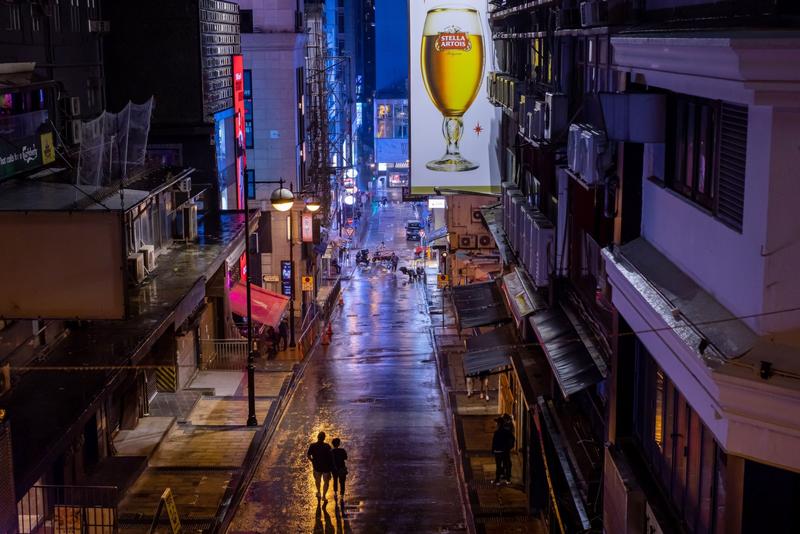 Pedestrians walk in an empty Lan Kwai Fong in Central, Hong Kong, on March 28, 2020. (PHOTO / BLOOMBERG)
Pedestrians walk in an empty Lan Kwai Fong in Central, Hong Kong, on March 28, 2020. (PHOTO / BLOOMBERG)
Hong Kong’s latest measure to stem the coronavirus outbreak is a ban on public gatherings of more than four people. That may seem straightforward enough, but the move is stoking confusion and sparking criticism from the city’s businesses.
One of the biggest questions facing listed companies in the financial hub is whether the ban applies to extraordinary general meetings (EGM) that are required for shareholders to approve major transactions. While several companies have pushed ahead with their EGMs, others have scrapped them. Some are looking for more guidance before they decide.
One of the biggest questions facing listed companies in the financial hub is whether the ban applies to extraordinary general meetings that are required for shareholders to approve major transactions
The lack of clarity has added to a sense of frustration among some in the city who say the government’s response to the crisis has at times been haphazard. Restaurants have been particularly vocal critics of the gathering ban, saying it took effect with too little warning and without much-needed measures to support the industry.
Coming into force on March 29 and lasting for at least 14 days, the ban is meant to help ward off a second wave of coronavirus cases in the city by slapping offenders with HK$2,000 fines. It applies to everything from wedding banquets to kids’ playgroups and theater productions.
ALSO READ: HK to limit public gatherings to 4, shut establishments
While the rules exempt gatherings such as annual shareholder meetings that “must be held within a specific period” to comply with existing regulations, EGMs fall into a gray area. There’s a real question with what to do about them and if they’re not held, deals might be delayed, said Mike Wong, chief executive officer of the Chamber of Hong Kong Listed Companies.
A handful of companies including Alibaba Health Information Technology Ltd have said they’ll postpone EGMs. Prosper Construction Holdings Ltd said it decided to proceed as scheduled, though would take steps not to go beyond the four-person-at-a-time rule.
A Hong Kong government spokesman confirmed that annual shareholder meetings are exempt from the ban but didn’t offer clarity on EGMs, saying: “Whether other types of meetings are exempt depends on their nature.”
Hong Kong’s stock exchange has advised companies to hold meetings “at place and a time convenient to the largest possible number of shareholders to attend.” The bourse encouraged companies to use webcasts and video conferences to maximize shareholder participation, and to explain clearly whether remote voting is allowed.
The Securities and Futures Commission said it’s “considering carefully policy options” for companies in light of the government restrictions on gatherings.
 Signs indicating tables are unavailable to enforce social distancing measures at a fast food restaurant are seen. In Hong Kong, March 28, 2020. (PHOTO / BLOOMBERG)
Signs indicating tables are unavailable to enforce social distancing measures at a fast food restaurant are seen. In Hong Kong, March 28, 2020. (PHOTO / BLOOMBERG)
Hong Kong’s restaurants are subject to a specific set of restrictions tied to the ban. They’re required to cut their capacity in half, limit each table to four customers and provide a minimum distance of 1.5 meters between tables. Offenders could face a HK$25,000 fine and six months’ jail time.
Simon Wong, chairman and CEO of Hong Kong-based restaurant operator LH Group Ltd, said he spent the weekend re-arranging tables to comply with the new rules and would have liked more time to prepare. He’s also frustrated that the government has yet to spell out how it will help his industry cope with the fallout.
“We are really confused on what to do next,” Wong said. “For example, if a restaurant asks the staff to take no-pay leave, will it be unqualified to get any potential government subsidies? Without a clarification of what support we can get, we have to continue the operations and are suffering big losses every day.”
READ MORE: Virus decimates HK retail sales value by record 44% in Feb
Green Monday, a Hong Kong-based startup that sells plant-based meatless pork and operates eight grocery stores and cafes in the city, said it recently had a line of customers waiting outside even though half its tables were empty to comply with the gathering ban. “It was surreal,” said David Yeung, the company’s founder.
Yeung said the company’s grocery business has been surging as demand for home-cooking rises, but he expects many of his peers are suffering losses because they aren’t diversified.
“We understand this is a mega-crisis and we have to make sure of safety,” he said. “But I think the economic loss could be equally devastating too as Hong Kong would see more store closures and people unemployed in the near future.”


